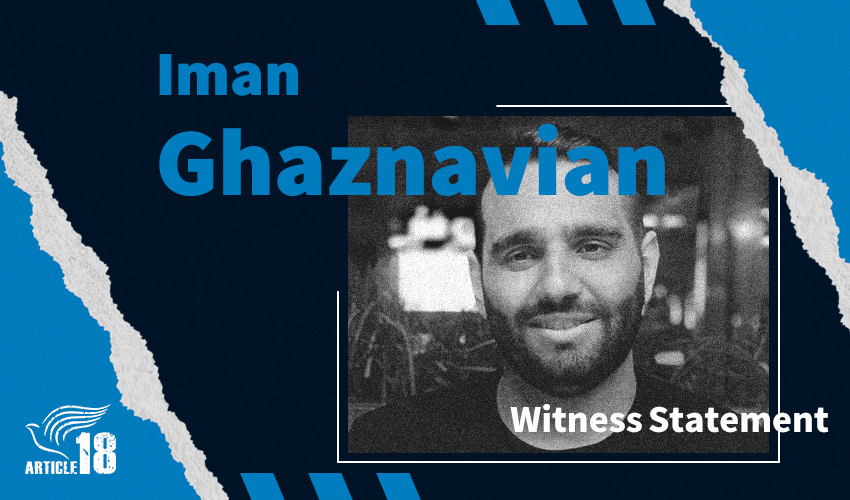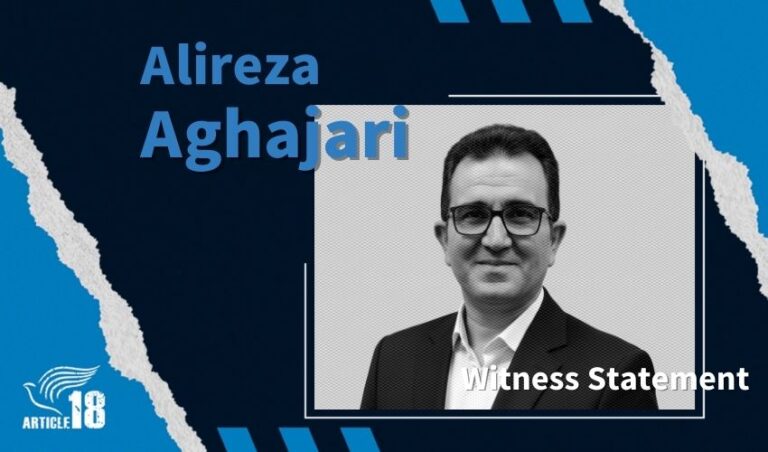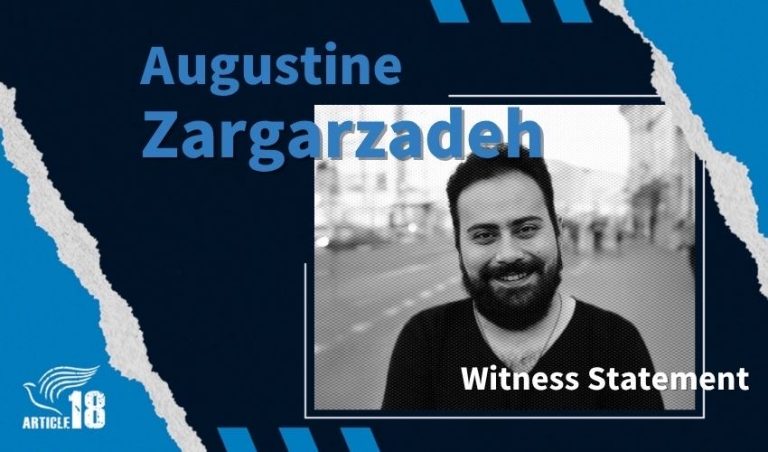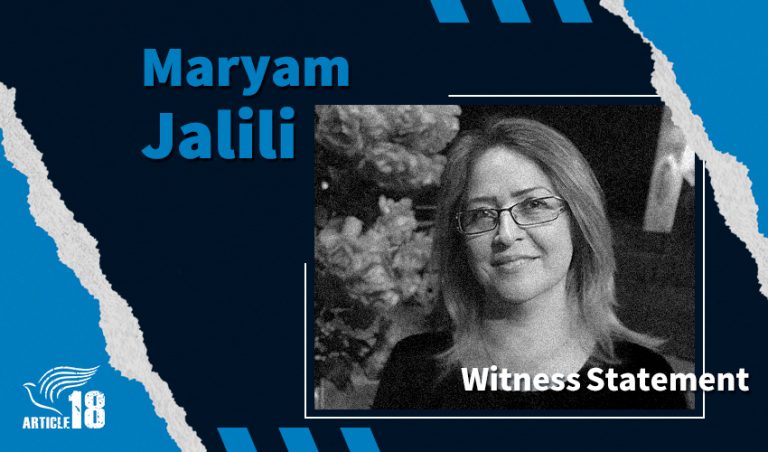For a summary of Iman’s story, you can read our feature article here.

Background
1. My name is Iman Ghaznavian Haghighi, and I was born in 1986 in Shiraz. My father passed away when I was 11 years old, so I had to study and work at the same time. A while later, I became a Christian and an active member of a Christian youth group in Shiraz. On 18 September 2012, I was arrested at my home and detained for 26 days in the Ministry of Intelligence Prison in Shiraz. I was then released on bail and later forced to leave my home country.
Conversion
2. I was in contact with members of other religious minorities in Iran, and I watched the Apadana Christian Channel, which had two-hour Christian programmes. I liked what I heard, but at the same time I couldn’t quite accept it. I decided to email the Apadana Channel and to request a Bible, so they sent me a New Testament. I was very interested in the Gospel of John.
3. I eagerly read the Bible day and night. After a while, another Christian channel was launched and I called that channel and asked to be introduced to a church. After five to six months of out-of-church contact, they knew me better and connected me to a house-church. I took part in discipleship classes for a while, and then I engaged in Christian activities with the youth in Shiraz and other cities. Finally, in May 2009, I was baptised outside Iran.
4. A few months after I returned, on 22 June and 11 July 2009, all the leaders of our house-church were arrested by agents of the Islamic Revolutionary Guard Corps. All the other leaders left Iran, so I was alone in Shiraz, but after a while I continued with my Christian activities.
5. For about four years, my family had difficulties with my belief in Jesus, but after they recognised changes in me, and attended one of the house-church meetings and got to know that the church was a place where Christians had amicable relationships with each other, their point of view changed.
Arrest
6. On 18 September 2012, at 7 o’clock in the morning, the doorbell rang, and I was just opening the door when three strong agents from the Ministry of Intelligence pushed me inside. They entered the house, without a warrant. They angrily asked my mother and my sister, who had come the night before to visit me, to put on their headscarves. They sat us on a sofa and put another one in front of our feet so that we couldn’t move, saying: “You’re not allowed to talk.” My mother and sister were both shocked and very scared, but I felt a strange peace, alongside a little fear.
7. They confiscated my mobile phones, laptop, books, CDs, and even a Jewish candleholder I had bought from India, and everything else related to Christianity. Then they put me into a car. Two people sat in the front, one of whom was the driver, and two others sat in the back, one on each side of me. They lowered my head so I couldn’t see anything along the way. At the same time, 13 other Christians were also arrested. They signed commitments to partake in no further Christian activity, and were released at noon that day.
Detention and interrogations
8. I was detained for 26 days in the Shiraz Ministry of Intelligence Prison. They gave me clothes, trousers, shorts, a blue towel and three blankets. The light in my cell was always on. The very small cell was about three square metres, so it wouldn’t be possible to even sleep if two or three people were in that cell. It also smelled really bad. Because I was arrested in the summer, the weather was very hot, so that also made it really uncomfortable. I was alone in the cell for nine days, but after that I was put in a cell with two others, though they constantly changed who I was with. This was also a mental torture for me, because as soon as we became friends and I got used to them, they separated us.
9. On the second day, I was taken to the prosecutor’s office, where two people were in charge, who treated me very harshly. They had recently arrested some Baha’is, whose families had contacted the media to highlight how minorities were being unfairly treated. I wasn’t allowed to speak, and they made fun of me. I was told: “Shut up, you aren’t allowed to talk!” We were there for 20 minutes. They gave me a piece of paper, on which I had to answer these questions: “For how many years have you believed in Jesus Christ? How did you come to this belief? Have you been baptised? Which Christian denomination do you belong to? Have you been in contact with Christian channels abroad?”
10. They took me for interrogations at different times of the day, and the interrogations took at least 10 hours each day, with repeated questions such as: “When and how did you start to believe in Jesus Christ? Where did you get your Bible? How many people did you evangelise? Why did you evangelise? What was your responsibility in the church?” And also they told me I had to write down the names of the leaders and other members of the house-church. From those who had been arrested before, I had learned that I should confess the names only of those Christians who had already left the country, as they would not be in any danger.
11. I was blindfolded while I was interrogated, and they cuffed my left hand to a chair and left my right hand free so that I could write. I could only see the sheets of paper out of the corner of my eye. I didn’t see any of the interrogators, and they only called each other by the same nickname: “Abdullah”. They insulted me and said, “You are dirty! Why did you change your religion? You have made yourself miserable!” They pushed me around, and belittled me.
12. I have inherited high blood pressure, and it was much higher in the prison because of the stress. I had a lot of headaches at night and suffered from a nosebleed, but no doctor examined me during my detention. After my release from prison, I went to a doctor, who was very surprised by my condition and told me: “It’s a miracle you haven’t had several strokes!”
13. During one of the interrogations, for two hours I was sitting alone in a room facing the wall, and under the blindfold I could see a person who was being tortured with a stun gun and thrown to the ground. He moaned and screamed and was thrown to the ground every time he was attacked with it. When I was brought back to my cell, after a while they brought that same person, who was called Khalil, to my cell.
14. He told me he had escaped from prison 11 times and had been brought from the city of Jahrom [200km southeast of Shiraz] for raping the son of the city’s intelligence chief. He also tried to injure himself so that he would have to be taken to hospital. I prayed seven to eight hours every day, and despite my fear, I decided to speak to him about Jesus Christ for about an hour. When I finished speaking, Khalil’s face and the face of the other cellmates who had listened were wet with tears. Khalil said: “You changed my point of view towards God. I had never heard someone speak about God like this before.” He asked me to talk more about Jesus that night. We talked for a day and a half about Jesus, and I would be very happy even if all that happened to me during my detention was for Khalil to be redeemed.
Release
15. The day before my release, on 15 October, I was forced to make a video confession. They said: “Be sure to take a shower first.” Then they gave me the clothes I’d arrived in on my first day to change into. They asked me again all the questions they had asked me during the interrogations, but this time in front of the camera. They asked me to testify against Christianity and other Christians, and provoked me with these words: “Your friends have betrayed you, and given us your name.” But I testified to my faith in Jesus Christ and said: “My friends have never done me wrong before. Even if they gave you my name, they must have been under pressure, and I forgive them.” Their goal was to divide us so that we wouldn’t be in contact with each other after our release.
16. My bail amount was set at 150 million tomans [approx. $50,000]. Our house was examined by an expert, and he set the worth of the house at lower than the bail amount, so in addition to the deed for the house, a relative’s salary slip also had to be pledged as a guarantee. Also, my family was called from prison and told: “You have to pay for the food we gave to your son during these 26 days.”
17. Before my arrest, I used to study at night, and my dream was to study business administration at university, but unfortunately, after my arrest, the university told me my name wasn’t on the registration list. I was also very good at the profession of laying tiles and ceramics and, with a lot of difficulty, I had managed to get myself a license to work for myself in that profession. But after my release, no license was approved for me. I decided to work for someone else, who told me how much they appreciated working with me. But a week later, when I went to his workplace, he said: “Unfortunately, I can no longer work with you.”
18. It was a time of confusion for me. On the one hand, I didn’t know what sentence the court would issue; and on the other, I didn’t have a job. This waiting period was very difficult for me. Before believing in Jesus, I had longed for education, a car, and so on, and after my conversion I longed to serve in the Church. I felt hopeless after my release and said to myself: “Why am I alive?” The only reason I lived for was my family.
19. I kept receiving calls from the intelligence service, and was told: “We’re watching you everywhere you go!” So I couldn’t keep in touch with other house-church members. Every two weeks, the Ministry of Intelligence would call and say: “Your crime is very serious! If you write a blog against Christianity, or travel abroad to spy on the activities of the Christians, we will acquit you.”
20. Once a week I had to go to a cleric named Mr Momeni, who talked to me about Islam, the Quran, and so on. A book titled ‘The Evangelising Christianity’ was given to me to read, and he went through every page with me. Those were very difficult days, because I had no knowledge of any Christian apologetics, and Mr Momeni’s words challenged me. I once said to him: “Have you ever been electroshocked?” He said: “Yes, when I was a child.” I said: “You don’t see the electricity, but you can feel the effect. In the same way, I have met Christ and experienced being with him.” He became so angry that, although he usually took me home, that time he said: “Go home yourself!”
Court
21. About 10 months after my release, the court trial was held in Branch 1 of the Revolutionary Court of Fars Province. The judge in my case was Seyyed Mahmoud Sadati. In the first days after my arrest, they had told me my charge was “acting against the security of the regime”. After my release, I was interrogated again and my charge was replaced with “forming small groups to overthrow the regime”. This charge was later removed and, finally, in the court, a verdict was issued to me on the charge of “propaganda against the regime”.
22. I didn’t have a lawyer, either at the prosecutor’s office or at the court. It took about a month and a half from the time of my trial until the sentencing. The court sentenced me to five years’ suspended imprisonment. Another Christian woman, who I used to do Christian activities with at the house-church, was also sentenced to five years’ suspended imprisonment. They read the verdict out to us, but didn’t show us the written verdict. No exit ban was imposed on me.
23. In court, I had to promise that I would go to the Ministry of Intelligence once every two months in the first year, every six months in the second year, then once in the third year of my sentence, to introduce myself and give my signature. The only evidence I have now of all that happened to me is one document that was given to me at Adel Abad Prison in Shiraz, the day my suspended sentence began.
24. Two weeks later, I fled Iran.



0 Comments
Trackbacks/Pingbacks